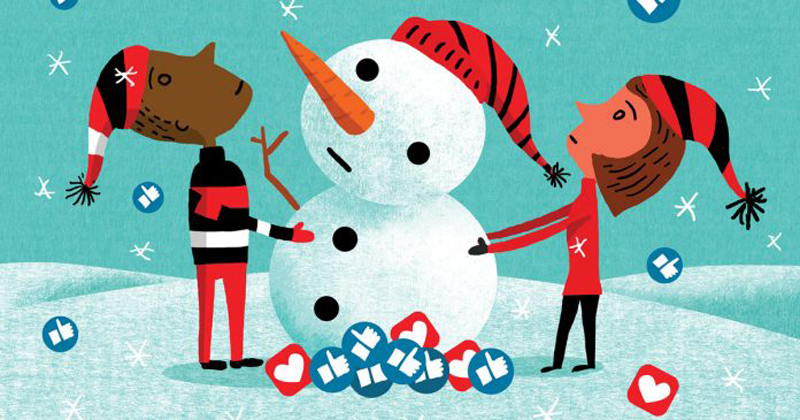
In part, Amber Lewis, director of digital and social media for the City of Detroit, is responsible for romanticizing the city’s winter wonderland throughout the holiday season. “During the holidays,” she says, “we’re pushing the tree lighting, we’re pushing different holiday activities, and we look at who engages with us, because that’s important.” Lewis and her team of two maintain near constant contact with over 60,000 followers across Facebook, Instagram, Twitter, YouTube, LinkedIn, Nextdoor, and Spotify.
“Have yourself a merry little #Christmas,” reads one city Twitter post. “It’s officially the holiday season in #Detroit! The Christmas tree at @CampusMartius has been lit!” declares another. Despite a cheery tone and well wishes for local followers, for some social media subscribers, the more they see online — of glittering party outfits, giddy families unwrapping presents around the tree, the annual ski trip to Aspen — the unhappier they may become.
“The holidays, even though they’re an extremely enjoyable time for the majority of us, can also be a time when a lot of difficult memories come up,” says Charlie Starkman, limited license clinical psychologist at New Oakland Family Centers in Farmington Hills. Though historically, the holidays have presented significant challenges for those who have experienced loss or grief, Starkman adds that a new source of angst during the holiday season, particularly for millennials, is presented by an element that has become the crux of our society in recent years: social media.
“With social media, we’re seeing people’s lives as though they’re perfect,” Starkman says. “When we see these pictures, videos, Snapchats, they can bring up feelings of depression, envy, shame, and guilt. We place so many unrealistic expectations on ourselves.”
“When we see these pictures, videos, Snapchats, they can bring up feelings of depression, envy, shame, and guilt. We place so many unrealistic expectations on ourselves.”
— Charlie Starkman
Maureen Bernard, clinical therapist for Jewish Family Service of Metro Detroit with locations in both Oak Park and West Bloomfield, details research on what she calls “Facebook envy.” A 2017 study published in the American Journal of Epidemiology found that both “liking” the content of others and clicking on links predicted a reduction in self-reported physical health, mental health, and overall life satisfaction. The study also concluded that the observed declines in well-being were a result of quantity of use, not just quality. “People post their holiday photographs, all their presents, their beautiful tree,” Bernard says. “What’s really difficult is if there is estrangement in the family or a recent breakup, where you can see how much better they seem to be doing without you.” She reminds patients experiencing anxiety or insecurities triggered by visuals seen on social media that people are inclined to post what they want others to see. “People are only putting their best foot forward.”
And in her book iGen: Why Today’s Super-Connected Kids are Growing Up Less Rebellious, More Tolerant, Less Happy—and Completely Unprepared for Adulthood— and What That Means for the Rest of Us, University of Michigan alum and San Diego State University professor Jean Twenge (rhymes with hinge) coins the term iGen for those born between 1995-2012. She writes, “It’s not an exaggeration to describe iGen as being on the brink of the worst mental health crisis in decades. Much of this deterioration can be traced to their phones.”
In an effort to overcome social media’s Scrooge effect, metro Detroiters are working to get fellow locals off of their phones and into the holiday spirit in real time. Rock Ventures, arguably downtown’s largest employer of millennials, offers a dizzying array of outdoor markets, exhibits, and other activities to create an offscreen community among its workforce. “We want our people to enjoy the holiday spirit, the positive energy of being downtown,” says Francesca “Frenchy” George, Bedrock Detroit director of retail development.
Terrence Shulman, founder and director of the Franklin-based Shulman Center for Compulsive Theft, Spending & Hoarding, says, “I remind my clients to focus on the true spirit of the holidays. Creativity, gratitude and appreciation, miracles and wonder, giving from the heart, renewal.”
As for Lewis, positive affirmations via the City of Detroit’s social media channels will always be available for those hesitant to unplug.
May Your Days Be Merry & Bright
More pro tips for a jolly season
Plan ahead: “What are you going to do? What are your problem areas?” Bernard asks. “Is this a good time to binge-watch movies, or time to put on your favorite Motown music and clean out a closet? Charitable organizations always need help over the holidays, but those volunteer jobs get snatched up fast. So, plan ahead.”
Tune in to your emotions: “Before going onto social media around the holidays, check in with how you’re feeling,” Shulman advises. “If you think posts of friends and family engaging in holiday activities will make you angry, envious, or sad, hold off. Wait until you’re in a better emotional place.” Or, as Bernard states, “If you know turning on social media has pissed you off the last three Christmases in a row, don’t do it.”
Set a timer: Buy one of those kitchen timers mom used to have — or use your cell phone — and limit your daily time on social media. “The more time we spend in front of the screen, the easier it is to get sucked in,” Starkman says. “Spend no more than 30 minutes on social media, then turn off the computer, put down your phone. Putting limits on yourself can be really helpful.”
Seek human contact: Starkman calls this “behavioral activation.” Seek out like-minded social media sufferers or others who’ve boldly gathered with strangers for the holidays. For example, Jonathan Kung, chef at the Kung Food Market/Studio in Eastern Market, hosts a Christmas Day Orphans Dinner open to fellow members of the food and beverage industry. “A lot of us aren’t close to family so we make our own,” Kung says. “And with the hot-pot format, people can come anytime throughout the day.” Sites like meetup.com may also be a good place to start.
Throw a pity party — then move on: “There needs to be acceptance that, ‘I’m going to feel a little sad and it’s OK, because I miss my loved one, or I regret I was never able to have the family I wanted,’ ” Bernard says. “Whatever the realities of your life are, own them, accept them. You have some control over what you do with it.”
|
|
|









